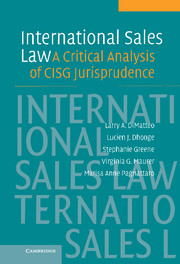Book contents
- Frontmatter
- Contents
- Preface
- Acknowledgments
- 1 INTRODUCTION
- 2 CISG METHODOLOGY AND JURISPRUDENCE
- 3 FORMATION: WRITING REQUIREMENTS
- 4 FORMATION: OFFER AND ACCEPTANCE RULES
- 5 OBLIGATIONS OF BUYERS
- 6 OBLIGATIONS OF SELLERS
- 7 COMMON OBLIGATIONS OF BUYERS AND SELLERS
- 8 BREACH OF CONTRACT BY SELLER
- 9 BREACH OF CONTRACT BY BUYER
- 10 DAMAGES, EXCUSE, AND PRESERVATION
- 11 SUMMARY AND OBSERVATIONS
- TABLE OF AUTHORITIES AND CASES
- APPENDIX A: UNITED NATIONS CONVENTION ON CONTRACTS FOR THE INTERNATIONAL SALE OF GOODS (CISG) (APRIL 11, 1980)
- APPENDIX B: CISG: TABLE OF CONTRACTING STATES (AS OF FEBRUARY 8, 2005)
- Index
1 - INTRODUCTION
Published online by Cambridge University Press: 06 August 2009
- Frontmatter
- Contents
- Preface
- Acknowledgments
- 1 INTRODUCTION
- 2 CISG METHODOLOGY AND JURISPRUDENCE
- 3 FORMATION: WRITING REQUIREMENTS
- 4 FORMATION: OFFER AND ACCEPTANCE RULES
- 5 OBLIGATIONS OF BUYERS
- 6 OBLIGATIONS OF SELLERS
- 7 COMMON OBLIGATIONS OF BUYERS AND SELLERS
- 8 BREACH OF CONTRACT BY SELLER
- 9 BREACH OF CONTRACT BY BUYER
- 10 DAMAGES, EXCUSE, AND PRESERVATION
- 11 SUMMARY AND OBSERVATIONS
- TABLE OF AUTHORITIES AND CASES
- APPENDIX A: UNITED NATIONS CONVENTION ON CONTRACTS FOR THE INTERNATIONAL SALE OF GOODS (CISG) (APRIL 11, 1980)
- APPENDIX B: CISG: TABLE OF CONTRACTING STATES (AS OF FEBRUARY 8, 2005)
- Index
Summary
“[E]ven when outward uniformity is achieved, …, uniform application of the agreed rules is by no means guaranteed, as in practice different countries almost inevitably come to put different interpretations upon the same enacted words.”
“[H]ow [does one] determine which interpretation should be preferred when the CISG itself gives rise to different autonomous interpretations [?]”
A hopeful note was expounded 250 years ago by Lord Mansfield when he stated that “mercantile law … is the same all over the world. For from the same premises, the sound conclusions of reason and justice must universally be the same.” The universality of commerical practice provides the opportunity to structure a uniform law of sales premised upon the commonality of practice. It is on this view of the universality of commercial practice that the success of a uniform international sales law is hinged. Critics of such a view assert that such uniformity efforts are both unwise and doomed to failure. Unwise, because there are substantial and reasonable differences in national practices that are reflected in differences in national laws. Doomed to failure, because legal and cultural differences will necessarily be reflected in the national courts' interpretations of a supranational sales law. Thus, the uniformity of form (a single body of rules) will lose to non-uniform application (jurisprudential chaos). A middle view between Mansfield's idealism and the realist critque will be discussed later in this chapter.
- Type
- Chapter
- Information
- International Sales LawA Critical Analysis of CISG Jurisprudence, pp. 1 - 18Publisher: Cambridge University PressPrint publication year: 2005

